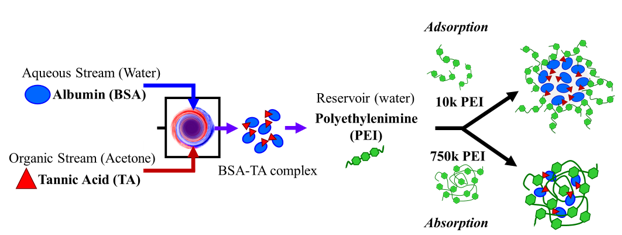Nano-medicine Formation
Biologics Encapsulation
Rapid, one-step process for encapsulation of biologics
There are a large percentage of new biologic drug prospects that have high aqueous solubility, but are susceptible to rapid clearance, preventing the development of suitable biologic formulations. Flash NanoPrecipitation (FNP) is a process which through rapid mixing stabilizes a compound of interest such as drugs into a nano-sized, polymer-stabilized delivery vehicle. Previously, FNP has been limited to the encapsulation of hydrophobic molecules (logP>6) based on hydrophobic interactions. However, extending FNP to encapsulating hydrophilic molecules such as biologics (i.e., proteins) would provide a rapid method to expand the clinical applications for biologic-based therapies. Others have also approached encapsulating biologics with FNP; however, they require multiple steps, which is in contrast to the process presented here.
The technology
Virginia Commonwealth University researchers have developed a rapid, single-step process using FNP to encapsulate biologics using a cationic polyelectrolyte and tannic acid (TA). The intermolecular interactions for forming the nanoparticles allows for high biologic loading, which increases the bioavailability. The benefit of increased bioavailability is a high delivery dosage. Such an approach would be used for protein therapies, cancer treatments, and diseases that require high specificity.

Figure 1: Diagram of a model system example encapsulating BSA, a model protein, using FNP with TA to form an anionic precipitate that is stabilized with a cationic polymer stabilizer (i.e., polyethylenimine or PEI). The mechanism of self-assembly is affected by the molecular weight of the PEI.
